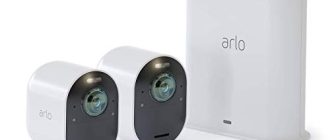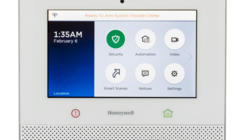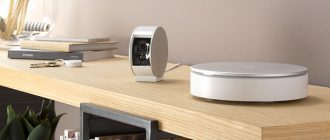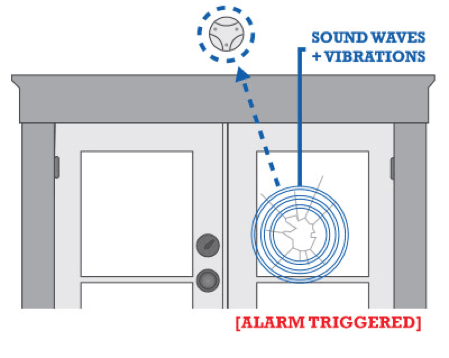
How Does The Home Security System Work
Home security systems have become increasingly popular in recent years as people seek to protect their homes and loved ones from potential threats. But how exactly does a home security system work?
The basic premise of a home security system is to detect any unwanted or suspicious activity in and around your home, and then alert you or the appropriate authorities. This is achieved through a series of interconnected devices and sensors that are strategically placed throughout the property.
The heart of the system is the control panel, which acts as the central hub for all the connected devices. It is responsible for receiving signals from the sensors and relaying them to the monitoring station or your smartphone. In case of a breach, the control panel triggers the alarm and initiates the appropriate response.
The sensors themselves come in various forms, such as door and window sensors, motion detectors, glass break sensors, and smoke detectors. Each sensor is designed to monitor a specific area or detect a particular type of threat.
In addition to the sensors, a home security system may also include cameras, door locks, and other smart devices that can be controlled remotely. These devices provide an extra layer of protection and allow you to monitor your home even when you’re away.
In conclusion, a home security system works by using a combination of sensors, cameras, and smart devices to detect and respond to any potential threats. It provides peace of mind knowing that your home and loved ones are protected, whether you’re inside or away.
What Is a Home Security System?
A home security system is a comprehensive network of devices and software that work together to protect a home from potential security threats. These threats can range from burglary and break-ins to fire and carbon monoxide poisoning.
The main purpose of a home security system is to monitor and detect any unauthorized entry or suspicious activity within or around a home. This is achieved through a combination of various components, including sensors, cameras, alarms, and control panels.
How does a home security system work? Essentially, the system is designed to detect any unusual or suspicious activity and notify the homeowner or a professional monitoring service. This can be done through different methods, such as sending alerts to a smartphone or triggering an audible alarm.
Security sensors are a crucial part of a home security system. These sensors are placed on windows, doors, and other entry points to detect any unauthorized entry. When a door or window is opened, the sensor sends a signal to the control panel, which then triggers an alarm or sends an alert.
Cameras are another important component of a home security system. They provide visual monitoring and can capture footage of any suspicious activity. This footage can be accessed remotely by the homeowner or a professional monitoring service, providing valuable evidence in case of a break-in or other security incident.
In addition to sensors and cameras, a home security system may also include other devices such as smoke detectors, carbon monoxide detectors, and motion sensors. These devices work together to provide comprehensive protection against various security threats.
The Importance of Home Security
Home security is a crucial aspect of daily life, as it ensures the safety and protection of individuals and their belongings. With the rising crime rates, it’s imperative to understand how home security systems work and how they can significantly enhance the overall security of your home.
A home security system does more than simply protect your property from intruders; it provides peace of mind to homeowners. Knowing that your home is equipped with advanced security measures gives you confidence in leaving your house unattended, whether it’s for a short trip or an extended vacation.
Maintaining the security of your home involves various components and features. These include sensors, alarms, surveillance cameras, access controls, and monitoring services. These elements work together to ensure that any unauthorized entry or suspicious activity is detected promptly and appropriate actions are taken.
One of the primary functions of a home security system is to deter burglars and potential criminals from targeting your property. Visible security cameras and alarm systems act as a deterrent, as criminals are less likely to attempt a break-in if they know they are being monitored. This reduces the risk of theft and damage to your home.
In the unfortunate event of a break-in, a home security system can alert both you and the authorities. Most modern systems use wireless technology to notify homeowners and monitoring centers instantly when a security breach is detected. This allows for quick response times and can help prevent further loss or damage.
Another critical aspect of home security systems is fire and carbon monoxide detection. These systems can detect smoke, fire, or dangerous levels of carbon monoxide, allowing you and your family to evacuate the premises in a timely manner and contact emergency services.
Additionally, home security systems can provide valuable evidence in the event of a crime or incident. Surveillance cameras capture video footage that can be used by law enforcement to identify suspects or apprehend criminals. This evidence can be crucial in ensuring justice and providing closure to victims.
Investing in a reliable home security system is a smart decision that can help safeguard your property, loved ones, and personal belongings. With advancements in technology, security systems are becoming more affordable and user-friendly, making them accessible to a wider range of homeowners.
Overall, the importance of home security cannot be underestimated. A comprehensive security system can significantly reduce the risk of break-ins, theft, and damage to your home. It provides peace of mind, deterrence to criminals, and the ability to respond promptly to emergencies. Prioritizing home security is a responsible and necessary step towards ensuring the safety and well-being of your household.
Types of Home Security Systems
When it comes to home security, there are various types of systems available to protect your property and loved ones. Each system has its own unique features and advantages. Let’s take a look at some of the common types of home security systems:
| Wireless Security Systems | These systems use wireless technology to connect the different components of the security system. They are easy to install and can be controlled remotely. Wireless security systems are popular for their flexibility and scalability. |
| Wired Security Systems | Unlike wireless systems, wired security systems use physical wires to connect the various components. They are typically more reliable and stable, but require professional installation. Wired security systems are suitable for homes with existing wiring infrastructure. |
| DIY Security Systems | Do-It-Yourself security systems are designed for easy installation by homeowners. These systems usually come with pre-programmed sensors and can be customized according to your specific needs. DIY security systems are cost-effective and can be easily expanded. |
| Monitored Security Systems | Monitored security systems are connected to a remote monitoring center. When an alarm is triggered, the monitoring center is notified and can take appropriate action, such as contacting the homeowner or dispatching emergency personnel. Monitored security systems provide an extra level of protection and peace of mind. |
| Unmonitored Security Systems | Unmonitored security systems do not have a connection to a monitoring center. Instead, when an alarm is triggered, the system itself emits a loud siren or sends alerts to the homeowner’s mobile devices. These systems are generally more affordable but rely on the homeowner or neighbors to respond to the alarm. |
| Smart Home Security Systems | Smart home security systems integrate with other smart devices in your home, such as door locks, lights, and thermostats. They can be controlled remotely through a smartphone app and often include features like video surveillance and voice control. Smart home security systems offer convenience and advanced automation. |
Choosing the right type of home security system depends on your individual needs, budget, and preferences. It’s important to research and consider all the available options to ensure the safety and protection of your home.
Components of a Home Security System
A home security system is a combination of various components that work together to protect your home and keep it safe from intruders. The system is designed to detect and alert you to any unauthorized entry or suspicious activity, allowing you to take appropriate action.
Here are the key components of a home security system:
- Control Panel: The control panel is the main hub of the security system. It serves as the central control and is responsible for communicating with all the other components.
- Door and Window Sensors: These sensors are placed on doors and windows, and they detect when they are opened or closed. They can also trigger the alarm if they are tampered with or broken.
- Motion Sensors: Motion sensors use infrared technology to detect movement within their range. They are typically placed in key areas of your home and can trigger the alarm if they detect any suspicious activity.
- Security Cameras: Cameras allow you to monitor what’s happening in and around your home. They can be placed both indoors and outdoors and provide a live feed or recorded footage for further analysis.
- Alarm System: The alarm system is designed to alert you and others when a breach is detected. This can be in the form of a loud siren, strobe lights, or a silent notification to a monitoring service.
- Keypad or Key Fob: Keypads or key fobs are used to arm or disarm the security system. They typically require a access code or a unique key to activate the system.
- Monitoring Service: Some home security systems offer the option of professional monitoring. In case of an alarm, the monitoring service is alerted and can dispatch appropriate help, such as the police or fire department, if necessary.
All these components work together to create an integrated home security system that provides comprehensive protection for your home and peace of mind for you and your family.
How Does a Home Security System Work?
A home security system is a comprehensive setup for protecting your home and ensuring the safety of its inhabitants. The system utilizes various components and technologies to achieve this goal.
The first essential component of a home security system is the control panel. This acts as the brain of the system, receiving signals from different sensors and devices. It is responsible for processing these signals and triggering appropriate responses, such as sounding alarms or notifying authorities.
The most common sensors used in a home security system are door and window sensors. These sensors are placed on entry points and can detect when a door or window is opened or closed. If an unauthorized entry is detected, the sensor sends a signal to the control panel, which can then activate an alarm.
Motion sensors are another commonly used component. These sensors use infrared technology to detect movement within a specific area. When a motion sensor detects movement, it sends a signal to the control panel, which can trigger an alarm or notify the homeowner.
Security cameras are also an important part of a home security system. These cameras can be installed both indoors and outdoors to monitor the surroundings and capture video footage. Some systems even allow for remote viewing of the camera feed, providing homeowners with the ability to monitor their property in real-time.
In addition to these components, a home security system may also include other devices such as smoke detectors, carbon monoxide detectors, and panic buttons. These devices are designed to provide additional layers of protection and ensure the safety of the occupants in various situations.
The system works by constantly monitoring the various components and sensors. When a sensor detects an event, such as an unauthorized entry or movement, it sends a signal to the control panel. The control panel then takes appropriate action, such as sounding an alarm, notifying the authorities, or initiating other predefined responses.
Many home security systems are now connected to the internet, allowing for remote access and control. Homeowners can use smartphone apps or web portals to arm or disarm the system, view camera feeds, receive notifications, and control various settings.
In conclusion, a home security system is a complex setup that utilizes different components and technologies to protect your home. The system works by constantly monitoring sensors and devices and triggering appropriate responses based on detected events. With advancements in technology, home security systems have become more sophisticated and interconnected, providing homeowners with enhanced convenience and peace of mind.
Wired Home Security Systems vs. Wireless Home Security Systems
When it comes to protecting your home, a security system is an essential component. But with so many options available, it can be overwhelming to decide which type of system will work best for you. One of the most significant considerations is whether to choose a wired or wireless home security system.
A wired home security system is a system that requires physical connections between the various components, such as the control panel, sensors, and cameras. These connections are typically made using cables, such as Ethernet cables or coaxial cables. This type of system is known for its reliability and stability, as it is not susceptible to interference from other wireless devices.
On the other hand, a wireless home security system operates using wireless technology, such as Wi-Fi or cellular signals. This means that the components of the system communicate with each other wirelessly, eliminating the need for physical connections. Wireless systems are often easier to install and can be more flexible to accommodate changes in the layout of your home.
Both wired and wireless home security systems have their advantages and drawbacks. Wired systems are generally more secure and less prone to hacking or interference. They also do not rely on batteries, ensuring that the system will continue to work even during power outages. However, the installation process for wired systems can be more complicated and time-consuming.
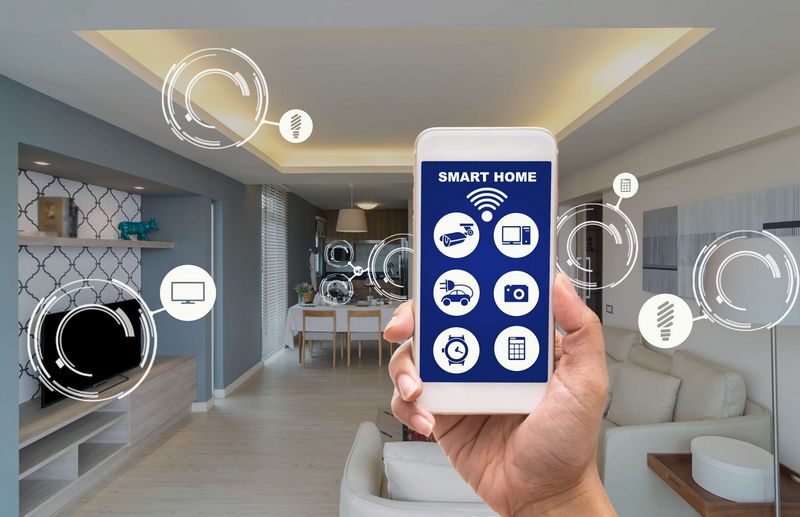
Wireless home security systems, on the other hand, are easier to install and can be more cost-effective. They can also be easily upgraded or expanded as your needs change. However, they may be more susceptible to interference from other wireless devices, and the wireless signals can be disrupted by environmental factors such as walls or distance.
In conclusion, choosing between a wired or wireless home security system depends on your specific needs and preferences. Consider factors such as the level of security you require, the installation process, and the flexibility of the system. Regardless of which type you choose, having a home security system in place is an essential step in safeguarding your home and providing peace of mind.
Choosing the Right Home Security System for You
When it comes to protecting your home and loved ones, having a reliable home security system is crucial. With so many options available in the market, choosing the right system can be overwhelming. Here are some factors to consider when selecting a home security system that best suits your needs:
- Assess your home’s security needs: Start by evaluating the vulnerabilities and potential entry points of your home. Take into account factors like location, neighborhood, and the size of your property.
- Determine your budget: Decide how much you are willing to spend on a home security system. Consider not only the upfront cost but also ongoing expenses like monitoring fees.
- Research different types of systems: There are various types of home security systems available, such as wireless systems, monitored systems, and do-it-yourself (DIY) systems. Understand how each type works and which one aligns with your preferences.
- Consider features and functionalities: Look for features that will enhance the security of your home, such as surveillance cameras, motion sensors, smart locks, and remote access capabilities.
- Assess monitoring options: Decide whether you want your home security system to be professionally monitored or self-monitored. Professional monitoring involves a monthly fee but provides 24/7 monitoring and quick response to emergencies.
- Read customer reviews and ratings: Research the reputation of different home security system providers. Read customer reviews and check ratings on reliable platforms to get an idea of their reliability and customer satisfaction.
- Consider additional services: Some home security providers offer additional services like home automation and integration with other smart devices. Evaluate if these additional services are important to you and if they are compatible with your system.
- Get professional advice: Consult with a security professional who can assess your specific needs and recommend the right home security system for you. They can provide valuable insights and help you make an informed decision.
Remember, the goal is to choose a home security system that provides comprehensive protection and gives you peace of mind. Take your time to evaluate different options and select the one that best fits your requirements and budget.
Professional Installation vs. DIY Installation
When it comes to home security systems, there are two main options for installation: professional installation and do-it-yourself (DIY) installation. Both options have their own advantages and disadvantages, so it’s important to understand how each option works in order to make an informed decision.
A professional installation involves hiring a trained technician to come to your home and install the security system for you. The technician will assess your home’s layout and needs, and then install the necessary equipment, such as cameras, sensors, and control panels, in the most optimal locations. They will also ensure that all components are connected and functioning properly.
One of the main advantages of professional installation is the expertise and experience that comes with it. The technician will have in-depth knowledge of how the system works and will be able to customize it to fit your specific needs. They can also provide guidance on the best placement for the equipment and offer tips for maximizing the effectiveness of the system.
On the other hand, professional installation can be more expensive than DIY installation. You’ll not only have to pay for the equipment, but also for the technician’s time and expertise. Additionally, scheduling an appointment and waiting for the technician to arrive can be inconvenient.
DIY installation, on the other hand, involves setting up the home security system yourself. This typically includes selecting and purchasing the equipment, reading the instructions, and installing the components according to the manufacturer’s guidelines. DIY installation is often more cost-effective, as you only have to pay for the equipment itself.
However, DIY installation requires some technical knowledge and skills. You’ll need to be comfortable with following instructions, handling tools, and troubleshooting any potential issues that may arise. It’s important to note that if the system is not installed correctly, it may not work properly, which could leave your home vulnerable.
In conclusion, both professional installation and DIY installation have their pros and cons. Professional installation offers expertise and customization, but at a higher cost. DIY installation is more affordable, but requires technical skills and may come with more risk. Ultimately, the decision will depend on your budget, time, and comfort level with technology.
Monitoring Services for Home Security Systems
Monitoring services for home security systems provide an additional layer of security by connecting the system to a central monitoring station. When an alarm is triggered, such as a motion sensor or door/window sensor being activated, the system sends a signal to the monitoring station. Highly trained professionals are then able to quickly assess the situation and take appropriate action.
One of the main advantages of having monitoring services for your home security system is the peace of mind it provides. With a monitoring service, you can rest assured that someone is always watching over your home, even when you are not there. If an alarm is triggered, the monitoring station will immediately contact you to verify the situation and will dispatch the appropriate authorities if necessary.
Monitoring services also add an extra layer of protection against equipment failures and power outages. In the event that your security system becomes disconnected or malfunctions, the monitoring station will be alerted and can take action to resolve the issue. This ensures that your home remains protected at all times, even when technical issues arise.
Additionally, monitoring services can provide additional features and benefits depending on the provider. Some monitoring services offer mobile apps that allow you to remotely monitor and control your security system from your smartphone or tablet. This enables you to arm or disarm your system, receive notifications, and view live footage from security cameras while you are on the go.
In conclusion, monitoring services are an essential component of any home security system. They provide an extra layer of protection, peace of mind, and quick response to potential threats. Whether it’s detecting intruders, alerting authorities in case of emergencies, or resolving technical issues, monitoring services ensure that your home and loved ones are always safe and secure.
Benefits of Using Home Security Systems
Home security systems are an essential part of keeping your home and family safe from potential threats. These systems work by monitoring your home and alerting you or the authorities of any suspicious activity or signs of a break-in. Here are some benefits of using home security systems:
- Protection for your family and home: The primary benefit of using a home security system is the protection it provides for your family and home. With sensors, cameras, and alarms in place, you can rest assured that any unusual activity will be detected.
- Deterrence of potential burglars: Just the presence of a visible security system can deter potential burglars from targeting your home. They are more likely to move on to an easier target if they see that your home is well-protected.
- 24/7 monitoring: Home security systems provide round-the-clock monitoring of your home. This means that regardless of the time of day, your home is being watched for any suspicious activity or signs of a break-in.
- Remote access: Many modern home security systems allow you to access and control your system remotely. With a smartphone app or a computer, you can check the status of your security system, receive alerts, and even control the cameras and sensors from anywhere.
- Insurance discounts: Having a home security system installed can potentially lower your home insurance premiums. Insurance companies often provide discounts for homes with security systems, as they are considered lower risk.
- Peace of mind: Perhaps the greatest benefit of using a home security system is the peace of mind it brings. Knowing that your home and family are protected gives you a sense of security and allows you to relax and enjoy your time at home.
In conclusion, home security systems are not only effective in preventing break-ins and protecting your home, but they also provide numerous other benefits that contribute to your overall peace of mind. Investing in a reliable home security system is a wise decision for any homeowner.
Costs Associated with Home Security Systems
When it comes to securing your home, investing in a home security system is a smart choice. However, it is important to understand the costs associated with these systems to make an informed decision.
The cost of a home security system varies depending on several factors. These factors include the type of system you choose, the size of your home, and the level of security features you desire.
There are two main types of home security systems: DIY (Do-It-Yourself) systems and professional systems. DIY systems are typically less expensive upfront because you install them yourself. However, they may require additional costs for monitoring and maintenance.
Professional systems, on the other hand, require professional installation and often come with a monthly monitoring fee. While these systems may have a higher initial cost, they offer professional monitoring and support, which can provide peace of mind.
In addition to the cost of the system itself, there are other expenses to consider. These may include additional security devices such as door/window sensors, motion detectors, and surveillance cameras. The number of devices needed will depend on the size and layout of your home.
Another cost to consider is the monthly monitoring fee. This fee covers the cost of having your system monitored by a professional monitoring center. It ensures that any alarms or alerts are quickly responded to, providing an extra layer of security.
Finally, it is important to factor in any additional costs for maintenance and repairs. Like any electronic system, home security systems may require occasional maintenance or repairs. It is wise to budget for these costs to ensure that your system remains in proper working condition.
In conclusion, while home security systems are an investment in the safety and security of your home, it is essential to consider the associated costs. By understanding the factors that contribute to these costs, you can make an informed decision and choose a system that meets your needs and budget.
Common Home Security System Features
When it comes to ensuring the safety and security of your home, a home security system is an essential investment. These systems offer a variety of features designed to protect your property and provide you with peace of mind.
Here are some common features you can find in a home security system:
| 1. Motion Sensors: | These sensors detect any movement in an area and trigger an alarm to warn you of potential intruders. |
| 2. Door and Window Sensors: | These sensors are placed on doors and windows to detect when they are opened or closed. They can also trigger an alarm to notify you of a possible break-in. |
| 3. Security Cameras: | Security cameras are an important part of any home security system. They provide visual surveillance and can be placed both inside and outside your home to monitor activity. |
| 4. Control Panel: | The control panel is the central hub of your home security system. It allows you to arm or disarm the system, and provides access to other features such as emergency buttons and communication with a monitoring center. |
| 5. Alarm Siren: | An alarm siren is a loud noise-producing device that is activated when a sensor is triggered. It serves as a deterrent to potential intruders and alerts you, as well as your neighbors, of a possible break-in. |
| 6. Remote Access: | Many home security systems now offer the ability to control and monitor your system remotely through a smartphone or computer. This allows you to check the status of your system, receive alerts, and even view live video feeds. |
| 7. Smoke and Carbon Monoxide Detectors: | Some home security systems also include smoke and carbon monoxide detectors. These devices can detect the presence of smoke or dangerous levels of carbon monoxide and trigger an alarm, helping to keep your home safe from fires and gas leaks. |
These are just a few of the common features you can expect to find in a home security system. Each system may vary in terms of specific features and capabilities, so it’s important to research and choose a system that best fits your needs and budget.
Q&A:
How does a home security system work?
A home security system typically consists of various components such as sensors, cameras, control panels, and an alarm system. These components work together to monitor and protect your home. Sensors are placed on doors and windows to detect any breaches, and cameras capture any suspicious activities. When a sensor is triggered or a camera detects something unusual, it sends a signal to the control panel, which then triggers the alarm system. This alarm alerts the homeowner and may also notify a monitoring center or the local authorities.
What are the main components of a home security system?
The main components of a home security system include sensors, cameras, control panels, and an alarm system. Sensors are placed on doors and windows to detect any breaches, and cameras capture any suspicious activities. The control panel acts as the central hub and receives signals from the sensors and cameras. If a sensor is triggered or a camera detects something unusual, the control panel triggers the alarm system, which alerts the homeowner and may also notify a monitoring center or the local authorities.
Can I monitor my home security system remotely?
Yes, many modern home security systems allow homeowners to monitor their system remotely. This can be done through a smartphone app or a web portal. The app or portal provides access to live video feed from the cameras, allows you to arm or disarm the system, and receive real-time alerts and notifications. Remote monitoring gives homeowners peace of mind and the ability to keep an eye on their home even when they are away.
Do home security systems require professional installation?
It depends on the type of home security system you choose. Some systems are designed for DIY installation and come with easy-to-follow instructions. These systems typically use wireless technology, making installation simple and convenient. However, there are also professional home security systems that require installation by trained technicians. These systems often offer more advanced features and may require additional wiring and setup. Professional installation ensures that the system is properly installed and optimized for maximum effectiveness.

